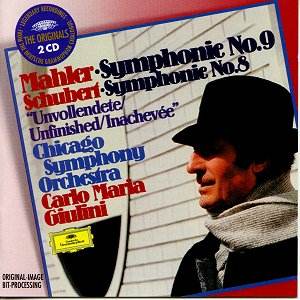MAHLER: Symphony No.9
SCHUBERT: Symphony No.8 "Unfinished"
 Chicago Symphony Orchestra
Conducted by Carlo Maria Giulini
Chicago Symphony Orchestra
Conducted by Carlo Maria Giulini
 Deutsche Grammophon
"Originals" 463 609-2
Deutsche Grammophon
"Originals" 463 609-2
Crotchet
Amazon
UK Amazon USA

Carlo Maria Giulini is a musician of the highest integrity who only lavishes
attention on works about which he feels he has something to say. Some composers
he never touches, others only lightly and Mahler is among the latter. He
has conducted and recorded only the First and Ninth Symphonies and Das
Lied Von Der Erde, as if only the beginning and end of Mahler's output
speaks to him. This Ninth was recorded with the Chicago Symphony Orchestra
in 1976 when Giulini was enjoying a joint conducting regime with Solti and
has always had the reputation of being a very particular recording of the
work. Perhaps because it was the product of such discriminating preference
and so has always had about it the air of someone giving us a distinctive
view of a much-loved work. Reacquainting myself with it in this new mastering
confirms this is not a Mahler Ninth for those who see it as mirror for great
psychological drama and tension. Giulini's agenda is refreshingly different,
though no less valid, so there is a place in a very crowded market for it.
The opening of the first movement has distinguished playing from the violas
with a grieving quality about them. In his notes David Gutman draws attention
to the fact that a Giulini hallmark is attention to the middle registers
of the orchestra, maybe the result of having played the viola himself. As
the first climax builds it soon becomes obvious this recording is notable
for balance and detail for there are aspects to the musical canvas Giulini
brings out which others do not. Woodwind parts are a prime example and I
noticed the bassoon more than I usually do. Giulini's overall approach in
this movement approximates towards Walter's second recording in being
long-breathed, steady and eschewing great contrasts. Note, however, in the
soft passage at the start of the development the way he delineates the, bitter
muted brass chords against the high strings and harp. Then in the crucial
passage at 148-210 the climax that results in collapse is remarkable for
a laying bare of the texture making a very astringent presentation of Mahler's
late style assisted by superb playing and engineering. The passage that follows
this is marked "passionate" and the way Giulini interprets it is perhaps
a good "freeze-frame" of his general approach. The "passion" is subsumed
into the general structure, held at one remove, but makes its effect by the
careful balancing of the string parts and an orchestra that is on top of
the music.
The second movement sees Giulini less trenchant than some colleagues in the
opening Landler but as the lower strings enter a welcome dose of earthiness
does colour proceedings up to a point. Giulini then makes us very aware of
the change from the Landler that is Tempo I to the Waltz that is Tempo II
as, more than most, he presents a very heavy-footed waltz indeed. The effect
is impressive, as also is the orchestra's delivery of it.
Not for Giulini the "smash and grab" Rondo Burleske third movement others
(Walter in 1938 or Bernstein at any time) indulge in. What we get here is
a considered, deliberate movement with once more superb marking of details
sometimes missed, notably in the lower strings. However, I do feel this movement
needs more "kick and scream" to make its effect so this is the one movement
where I feel Giulini's approach robs us of something important. I also think
his way with the sublime "Trio" central section that anticipates the last
movement is diminished by his greater astringency. It's very
interesting done like this - greys and browns instead of golds and
blues - but, like the rest of the movement, just not appropriate.
The final movement emerges as a noble and seamless orchestral song that,
like so much else in this performance, eschews the overt emotionalism found
under other batons and goes instead for refinement, balance and directness
of utterance. In those passages where Mahler's late style pares the music
down to almost nothing Giulini's ear for detail pays the greatest dividends
of all. In the rest, where the music is full throated and eloquent, I discovered
stoicism that is ultimately moving in that it presents great dignity in the
face of deep regret. All in all, this is a distinctive and remarkable view
of this work that I recommend in spite of reservations as credits more than
outweigh debits. The recording has come up beautifully in this new transfer.
A rich and varied sound palette that allows the superb Chicago Symphony,
sounding somewhat more mellow than we are used to from this period, to shine
through. In previous issues the more "bat-eared" of collectors have noticed
a tiny fault in the sound during some passages. The general consensus seems
to be that this has been rectified.
The Mahler Ninth will be the main reason for purchasing this set but the
coupling of Giulini's 1978 Chicago recording of Schubert's Unfinished is
generous. This is "big-band" Schubert with the breadth and scope of a Bruckner
conductor behind it. Giulini communicates an elegiac, world-weary quality
in the first movement with some wonderful wind playing. Then, in the second
movement the vast, burnished, Elysian calm that seems to envelop the whole
work is deeply affecting. This is certainly one of the finest accounts of
this work you are likely to find played in the old style.
Reviewer
Tony Duggan
Mahler:
Performance:

Recording:

Schubert:
Performance:

Recording:

See also review by John Phillips
